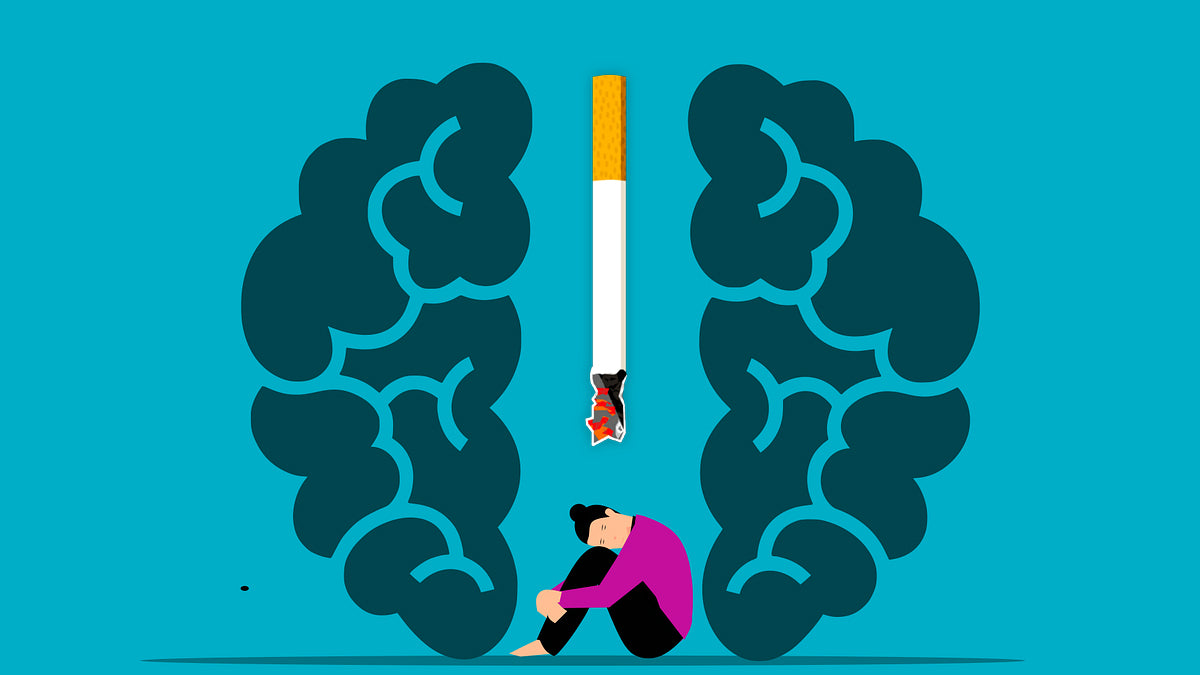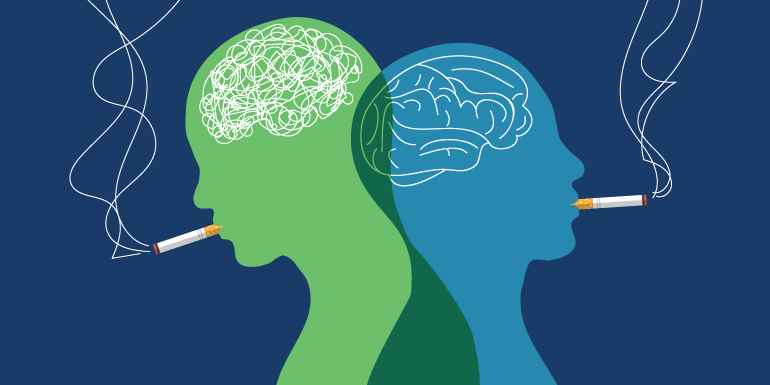Mental Health and Smoking: A Complex Relationship

Mental Health and Smoking: A Complex Relationship
Smoking has long been identified as a significant public health concern due to its well-established negative effects on physical health, including respiratory diseases, cardiovascular conditions, and various forms of cancer. However, the impact of smoking on mental health is often overlooked. The relationship between mental health and smoking is complex, involving psychological, physiological, and social factors. Individuals with mental health conditions are more likely to smoke, and smoking can exacerbate mental health issues, creating a vicious cycle that is difficult to break. Understanding this connection is critical for developing effective strategies to address both smoking cessation and mental health care.
The Prevalence of Smoking Among People with Mental Health Conditions
Studies have consistently shown that people with mental health disorders are more likely to smoke than the general population. According to research, approximately 40% of cigarettes smoked in the United States are consumed by individuals with mental illnesses, even though they only represent about 25% of the population. Depression, anxiety, schizophrenia, bipolar disorder, and post-traumatic stress disorder (PTSD) are all linked to higher rates of smoking. This increased prevalence can be attributed to several factors, including the use of nicotine as a coping mechanism, the neurobiological effects of mental health conditions, and the social environment of those affected.
For many, smoking serves as a form of self-medication. People experiencing stress, anxiety, or depression may turn to cigarettes to temporarily alleviate negative emotions. Nicotine stimulates the release of dopamine, a neurotransmitter associated with pleasure and reward, which can create a short-lived sense of relief. However, the calming effect is fleeting, and smokers often find themselves needing to light another cigarette to maintain the desired feeling. Over time, this cycle leads to addiction and a dependence on nicotine, which can worsen mental health symptoms in the long term.
How Smoking Affects Mental Health
Although nicotine may provide temporary relief from certain mental health symptoms, its long-term effects on the brain can be harmful. Smoking has been shown to exacerbate symptoms of anxiety, depression, and other mental health conditions. This paradox—where smoking initially seems to help but ultimately worsens mental health—complicates the relationship between smoking and mental well-being.
Nicotine affects neurotransmitters in the brain, including dopamine and serotonin, which play critical roles in mood regulation. When a person smokes, nicotine enters the bloodstream and triggers the release of these chemicals, leading to feelings of pleasure or relaxation. However, the brain quickly adapts to the presence of nicotine, and over time, it requires more nicotine to achieve the same effects. This process, known as tolerance, can result in mood disturbances and increased anxiety when nicotine levels drop, prompting the smoker to continue using tobacco to avoid these negative feelings.
Additionally, withdrawal symptoms, such as irritability, difficulty concentrating, and heightened anxiety, can occur when a person tries to quit smoking. These symptoms can be particularly challenging for individuals already struggling with mental health issues, making it harder for them to break free from the addiction. As a result, many people with mental health conditions become trapped in a cycle where smoking worsens their symptoms, but quitting feels too difficult to achieve.
The Social Stigma and Isolation
The stigma surrounding both smoking and mental illness compounds the problem. Many people with mental health conditions already face discrimination and social isolation, which can contribute to feelings of worthlessness, loneliness, and depression. Smoking, often viewed as a socially undesirable behavior, can intensify these feelings of isolation. Individuals who smoke may feel judged or marginalized, making it harder for them to seek help or support.
For those with severe mental health conditions, smoking may also be more prevalent in certain social environments, such as psychiatric hospitals or rehabilitation centers, where smoking is normalized. In such settings, the social pressure to smoke can be strong, reinforcing the habit and making it more challenging to quit.
Smoking Cessation and Mental Health: Challenges and Opportunities
Quitting smoking can be particularly difficult for individuals with mental health conditions, but it is not impossible. In fact, research shows that people with mental health disorders can successfully quit smoking with the right support and interventions. However, they may face unique challenges that require tailored approaches to cessation.
One major barrier to quitting is the fear that mental health symptoms will worsen during the withdrawal process. Some individuals are concerned that quitting smoking will lead to increased anxiety, depression, or irritability, making it harder to function. While it is true that withdrawal can temporarily exacerbate certain symptoms, studies have shown that quitting smoking ultimately improves mental health in the long run. Many people report feeling less anxious, less depressed, and more in control of their emotions after successfully quitting.
A comprehensive approach to smoking cessation for people with mental health conditions should involve both medical and psychological interventions. Nicotine replacement therapies (NRT), such as patches, gum, or lozenges, can help reduce withdrawal symptoms by providing a steady, controlled dose of nicotine without the harmful chemicals found in cigarettes. Medications like varenicline (Chantix) or bupropion (Zyban) can also be effective in reducing cravings and managing mood swings during the quitting process.
In addition to medical treatments, behavioral therapies, such as cognitive-behavioral therapy (CBT), can help individuals develop healthier coping mechanisms and address the psychological factors that contribute to smoking. Support groups and counseling services can also provide encouragement and accountability, making it easier to stay on track with smoking cessation goals.

Quitting smoking offers numerous benefits for both physical and mental health. For individuals with mental health conditions, these benefits can be even more significant. Research shows that people who quit smoking experience reduced symptoms of anxiety, depression, and stress over time. The act of quitting can also improve self-esteem and give individuals a greater sense of control over their lives, which can have a positive ripple effect on other areas of mental health.
In conclusion, the relationship between smoking and mental health is complex and multifaceted, but it is clear that smoking can have a profound impact on mental well-being. While smoking may provide temporary relief from negative emotions, it ultimately worsens mental health symptoms and perpetuates addiction. By understanding this connection and providing targeted support for individuals with mental health conditions, we can help break the cycle of smoking and improve overall well-being.
